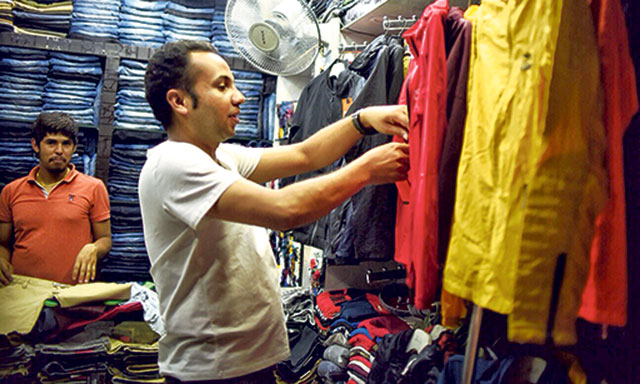Superstitions make us do weird things. We stop abruptly on our paths if a cat crosses the road in front of us, we hesitate to walk underneath a ladder and take great pains to go around it, and we knock heads again if we accidently bump our head with someone. That’s not all. It seems each and every one of us has our own set of superstitions, or beliefs as we would like to call them. It might have no logic behind it but, in its own way, it makes you feel good and gives you strength and that’s what’s important.
30-year-old Prem Bhandari, a physics teacher, claims that the number two has followed him throughout his life. He stood second in school exactly two times, he wears a number two jersey and he has crashed his motorbike exactly two times. There are more to recall but, for quite a while, he has decided that two is his lucky number. “Whenever I have to choose a number in any situation, I end up choosing two. I have rarely been disappointed,” he says.
Rajshree Karki, 19, who is preparing for her law entrance exams, wears her red stone pendant of Lord Ganesha set in silver and hardly ever takes it off. Her parents gave it to her years ago and although she wears them as a way of cherishing her parents, the pendant has proven to be a solace in difficult times.
“Although I’m a skeptic when it comes to religion, there is something nice in knowing there’s a sheath of protection around me. Wearing tokens of gods is considered to ward off evil so I wear my pendant in part because of that reason as well,” she explains. She remembers clutching her pendant during the earthquake in 2015 and doing so comforted her greatly. “We had no control over anything that was happening. At times like these holding onto something helps you,” explains Karki.
Ajita Duwadi, 18, who is currently taking a gap year, was told a great many things: That Sundays and Tuesdays are off the charts for taking a shower, Thursdays are days when married women shouldn’t wash up; that whistling inside one’s home is calling in evil spirits; and dogs howling is a foreshadowing of some tragic event. Born and raised in Dhading, Duwadi firsthand witnessed these practices and some she even follows herself. “My mother tells me that one’s pillow should face either east or north. I guess it is to do with magnetic poles but I can’t sleep a wink if my pillow doesn’t face the right direction,” she says.
Jeena Shrestha, 19, a high school graduate, refuses to cross roads if she encounters cats on her way. She particularly recalls an incident when she was walking to her school’s examination hall and a cat crossed her path. “Not that I believe in any of this stuff but I’m always jittery before taking an exam. So I do everything I can to calm myself down. Supposing I do cross the road, I will feel like I have done something I shouldn’t have. In stressful situations, logic leaves you. The solution is waiting for someone to walk past and when it’s that simple I don’t see the harm in waiting,” she explains.
Social Psychology of Elections

Most of the people this scribe spoke to seemed to be of the belief that whether or not you were superstitious, you really shouldn’t jinx yourself and invite negativity in life. And in many cultures too, most superstitions are intended to ward off bad luck or invite good fortune into people’s lives.
English footballer Jack Grealish’s “lucky boots” has the entire world talking. The 23-year-old player captains Aston Villa in the English Premier League and recently led his team to a huge victory against Derby in cleats that looked like they were barely holding together. The cleats are in tatters but Grealish favors them every time when playing a very crucial match.
Just this February Grealish made a return after an injury and he wore a pair of Nike shoes (Hypervenom Phantom IIIs) in his first game. Nothing looked in favor of the team and there were high chances of them never making it into the playoffs. But Grealish returned and the team won by 4-0 in their very first match. Aston Villa then went on a ten game win streak and the team made it to the playoffs. The club hit a record and Grealish decided that his boots were his lucky charm. He’s never taken them off since.
Like Grealish, many athletes have a routine or an item that they adamantly hold on to. Serena Williams has won 23 grand slam titles in her career and she too has a routine she abides by. Before a match, she always ties her shoelaces in a specific way, bounces the ball five times before her first serve and wears the same set of socks in each tournament. Legendary cricketer Sachin Tendulkar too, throughout his entire career, put on his left batting pad before his right one.
It might all seem to be in the mind but your mind plays an important role in controlling the outcome. Ashok Kalathoki, 32, talks about joining a training camp that required intense physical drills. All the participants had to carry heavy loads and run long distances in difficult conditions. Many couldn’t continue. “Just then our coach offered some painkillers to those who had given up. They took the medicine and ran just fine,” he recounts.
Later the instructor informed that the painkillers were merely paracetamol. “I will never forget what he said then. ‘It’s all in your head,’ he said. I think what you believe is very important even if the belief isn’t well justified,” he says. While growing up in Pyuthan, he witnessed many “witch doctors” cure the ill and he noticed that though they were experts at Ayurvedic medicine, what treated their patients was their own belief that they would get better.
And Bhumakala Khatri, 52, a stay-at-home mom, agrees with Kalathoki. Khatri grew up amidst all traditions and hearsays that governed life back when she was growing up. As far as she can remember, she has followed these “traditions”, at times questioning and abstaining from them as well. As a child she was told she would bring misfortune upon herself if she took a shower in the evening and for a large part of her life, she believed it too. But then she had to live in very hot regions in India where she had to toil under very hard conditions all day. “There was no way I was ending the day without a bath,” she says explaining why she had to give up her old ways and change.
But this isn’t to say that she no longer lives with the beliefs she grew up with. When she’s menstruating, Khatri abstains from all forms of involvement in the house and with the members of her family. And she encourages her daughter do the same. “My daughter doesn’t listen but kids today are different and I respect that. I, however, grew up with these ideas drilled into me. Going against them almost feels like going against my nature,” Khatri shares. What she still sticks to is her way of honoring her roots and traditions. “You do what you are comfortable with,” she concludes.

Myths: How they came to be
Can you recall all the times you’ve been chided by your elders for not closing your umbrella before entering the house or for trimming your nails late in the evening? You may have laughed off these warnings one too many times and dismissed them as silly superstitions. But, as it turns out, many of the things we were told not to do have some logic behind them.
Showers at night
It wasn’t just us Nepalis but most people all over Asia were told off for showering at night. Today, we believe that hot-water baths right before bed will not just rid you of the dirt and the impurities of the day but also help you sleep. But sleep experts assert that this is further from the truth. Our bodies indicate our bedtime with a slight drop in the body temperature. A shower, hot or cold will raise your temperature and make it even harder to sleep. This knowledge was passed down over the years and is exactly why your grandmother still scolds you for showering at night. Also, given the kind of weather people were exposed to during winters, showering at night made them more prone to catching fevers and the flu. In the distant past, fevers were more fatal than we can imagine.
Sutak for newborns
You may have noticed that when a child is born in your family, all family members are expected to abstain from all kinds of celebrations until the newborn is 10 to 15 days old. Sutaks (religious abstinence) are held for the departed as a way of mourning so it makes very less sense that the birth of a child (a joyous occasion) calls for a similar practice. Turns out, it was done all for the benefit of the child and the mother. During Sutak, the newborn is kept away from adults and the mother is confined to a room so that she may recover well. There was a time when the caste system played a huge role in people’s lives so people from the higher classes had shorter period of Sutaks as compared to those from the lower classes. Women of higher classes did lesser physically taxing tasks as compared to those from lower classes. Also the infant mortality rate was high back then, so families held back on celebrations until the immediate threat to the child’s life had passed which was usually 10 to 15 days.
Trimming nails in the evening
Many years ago, evenings were accepted as hours without light. So people got all of their tasks done when there was light (sunrise to sunset). Trimming one’s nails was also something you did in the daytime. Religiously too it was believed that evening marks the entry of Goddess Lakshmi. So tasks such as throwing out waste, paying off loans and cutting hair and nails were never carried out in the evening. There was a time when people used small-sized knives for cutting their nails and because at nighttime they had no lights, they could easily nip their fingers and toes. Hygiene also played a role because the cut pieces of nails would be scattered all around the house and, without light, they couldn’t be cleared away.
Lighting incense sticks at dawn and dusk
Incense sticks were originally made of herbs, tree barks, clarified butter (ghee), roots and flowers. Burning them has spiritual as well as practical purposes. Its fragrance has medicinal effects, can strengthen immunity, and helps with mental health and anxiety. Often incense sticks contain citronella (lemongrass oil) that acts as a natural insect repellent. This is also why temples used incense sticks so profusely – too keep away mosquitoes to provide an ideal spot for meditation. In Hindu households, incense sticks are lit during prayers and since these prayers happen early in the morning or right before sunset, incense sticks are burned then too. It’s a commonly agreed fact that bacteria is more active in these hours so burning incense sticks then makes complete sense.
No sweeping and mopping at night
In Hinduism, it’s believed that cleanliness is godliness. So there are numerous practices that emphasize on cleaning. But people often forbid you from cleaning, mopping or sweeping in the evening. Here again, due the lack of lighting in houses during the yesteryears, it was difficult for one to go about cleaning in the dark. People also wore precious heavy jewelry that could easily fall off when cleaning. Losing these valuables in the dark made it harder for them to be found. And since houses were made up of mud and stones so cleaning them meant an onslaught of dust that naturally irritates the nasal cavity. Also, most family members would be home by the evening and cleaning up then would make it uncomfortable for everyone. Plus the cleaner would naturally feel the urge to take a shower and, as mentioned above, showers in the evening were an absolute no-no.
No haircuts on Tuesdays
Although things have changed in the last decade or so, barbershops around Nepal and India shut down for business on Tuesdays. They would work on the weekends (for obvious reasons) but Tuesdays were when they took a break. Had they opened, it wouldn’t have mattered because Tuesday just isn’t the day for cutting one’s hair, or so we were told. Tuesdays in general were days when people were advised to limit their spending, or if possible not spend anything at all. This was used so that there could be a gap in one’s expenditure to allow for some saving. To hold off haircuts had the same logic, no spending on a Tuesday. There was a time when hair cutting was limited to a caste in the social hierarchy and while common folks were given a day off on Saturdays, the same didn’t apply to barbers. They had a large number of customers on weekends but on the weekdays, business was slow. Seeing as how Tuesday wasn’t for getting a haircut, they decided that day would be when they would take a break.
rakshya.khd@gmail.com







































